Pablo
The Pablo Saga
What makes a story into a saga? Well, I guess it's the length. In the case of Pablo, a Cuban street dog
discovered in Havana's Central Park last October, the story of Pablo has been a
saga for some time now. I started a file
on Amanda and Pablo last fall when Amanda found The Aniplant Project through
our website, theaniplantproject.org .
Today that file contains 175 email messages—all about Pablo. Pablo's story would be a common rehoming tale
of a Cuban street dog if it weren't for a plethora of twists and turns,
reverses and disappointments. As I like
to eat desert first, I'll tell you Pablo finally arrived safely at Amanda's
home yesterday, August 3, 2013.
Pablo had been the subject of another blog in this
series—one titled, "Pablo," in early November 2012. That blog told the story of Amanda finding a
vet in Havana to help the sick little dog, a mix up in meeting the vet to
receive Pablo, Pablo's being given to a stranger, and Nora's search for him
nailing up posters all over Central Havana.
By the time Nora found Pablo, Amanda had already flown back home to Los
Angeles.
A group of regular bench sitters in the park seemed to be
Pablo's custodians when Nora found him.
You just don't take an apparently stray dog until you're sure it doesn't
have a human who cares about it. This
group of young men liked Pablo and tried to care for him, but they couldn't buy
him food, and medical care was unattainable for them. Nora, using her widely
known public persona as a radio lecturer on animal protection, was able to
convince the park sitters that Pablo had a better future with her than loose in
the park.
The next step was to find a foster home for the young dog,
who needed lots of rehabilitation.
Fortunately a long time family friend (La Señora) wanted to care for
him. The downside was she was 95 years
old and couldn't get out and about in Havana.
For Pablo's entire stay in the foster home, Nora brought him food from
the Aniplant headquarters' dog kitchen every day. That was no small task, as it required a bus
ride to and from her visits with Pablo and La Señora. Also, Nora took Pablo to his vet
appointments.
For some rehomed strays, vet visits during their foster care
are straightforward affairs—rabies shots, tests for diseases, parasites, inoculations,
etc. Not so for poor Pablo who had a
terrible case of kennel cough. Weeks
dragged into months as the vet tried to fight off Pablo's infection. It was taking so long, I was afraid Amanda
would give up hope of adopting him. But
Amanda, Nora, and the vet were persistent, and at long last he was healthy, and
we could begin planning his travel to California.
Enter Davis Hawn, a friend of mine who loves dogs and has a
Master's Degree in training service dogs.
Davis has been to Cuba twice and is planning to establish a service dog
training center in Cuba. To that end
he had granted two scholarships for young Cuban adults to take a six week
summer course in training dogs at Bergin University near Napa Valley in
California. June 24 was the date the two
students were supposed to travel to the US for their course work. Nora suggested that one of the students,
Betty, could bring Pablo from Havana to Miami in a carrier with her baggage. It seemed ideal. In Miami, Amanda who was returning from a
trip to Paris France, could unite with Pablo, and, after a day or so of getting
to know each other, they could fly on to Los Angeles to begin Pablo's new
life. (Other blogs in this series are:
"Man's Best Friend" of January 2013 and"The Booster center"
of June 2013.)
So, on June 24, early in the morning Nora, Pablo, the
students, and their families gathered to see them off at Jose Marti
International Airport when the airline gave Betty and Nora an onerously worded
release form to sign where the airline would take no responsibility for Pablo's
safety. Briefly conferring with the
airport vet, a friend of Nora's, they found out there had been
"mishaps" with some dogs shipped as baggage with Cuban travelers who
were planning to return later to Cuba.
Perhaps it was a way to persecute Cuban travelers who might be trying to
defect to the US by simply staying there and not returning to Cuba at all. After all, why would a short term visitor to
the US need to bring his or her dog along for the trip? Sensing danger, the group of students and
family members unanimously decided Pablo was too valuable to risk possible
political shenanigans, and Nora kept Pablo in Cuba.
Poor Amanda, after 8 months of waiting, she's at Miami
Airport where she never sees Betty and finally gets the word she has to go home
without Pablo. In addition to all the
arranging, the wasted money was a blow.
I knew Nora would at once begin a plan to get Pablo here, but Amanda
must have been beginning to wonder if we were all a bunch of incompetents.
It wasn't very long until Nora told us Pablo would travel to
the US on August 2. This time I knew
there would be no disappointments, as she let me know Pablo would be
accompanying the wife of Spain's Ambassador to Cuba and their daughter. As the reader may know, diplomats travel much
better than regular people. Their
tickets, their baggage, their clearances through Customs and Immigration are efficient,
perfunctory, without waiting in lines, and deferential. Thus, Pablo would arrive in the US as a VIP.
Davis offered to meet Pablo in Miami so Amanda wouldn't have
to fly clear across the country twice to get him home, and Amanda happily
agreed. Davis had been in constant
contact with several airlines as he made plans for The Booster Center—the new
Cuban training facility. He had to fly
specially selected pups into Cuba for the Center, and now he was planning for
Pablo's flight to the west coast.
Airlines are often difficult to deal with, and, with regard
to dogs, they are especially idiosyncratic.
Some embargo moving live animals in the hottest months. Midsummer in Havana is especially hot. Some allow very small dogs in the passenger
cabin, and they are all afraid of a mishap harming someone's loved
companion. All have health certificate
requirements, and some in the US require these to be in English. The vet in Havana made the original
certificates out in Spanish. To make
matters worse. It's hard to talk with live people in authority in an
airline. But Davis had to know the rules
to make travel plans. A few days before
Pablo's flight, Davis sent two Golden Retriever pups back to Cuba with Betty
who graduated from Bergin University's summer program. Davis' tolerance for abuse is higher than
mine, and he eventually pinned down all the requirements for Betty's flights
and for the ongoing flight of Pablo.
That required picking up Pablo at midday in Miami, and getting him to a
vet in Ft. Lauderdale to redo his health certificate in English for his 7 am
flight to California.
So the Ambassador's wife was at a ticket counter with Pablo
and another dog traveling from Aniplant to Tampa when Davis spotted her about
two hours sooner than he had expected (Being a VIP, she had skipped all the
lines for Customs and Immigration.)
Davis took Pablo to the vet and then his hotel, and at 4 am he arrived
at Delta's cargo office in Fort Lauderdale, where Pablo went to sleep for
his 5 hour flight to LAX.
We were in sporadic phone contact with Amanda as she waited
for Pablo's flight. The plane had left
Florida 50 minutes late, so we were all beginning to imagine problems, but
other than landing about an hour late, it was a routine flight and Amanda and a
robustly healthy and happy Pablo were reunited ten months after she fell in
love with a sick little dog in a Cuban park.
Les Inglis













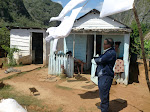




























































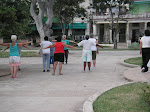
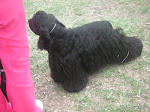
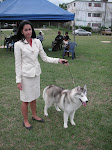


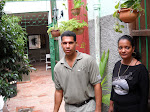




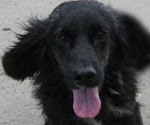
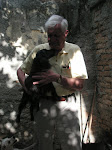
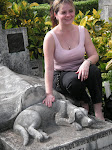


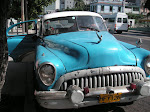

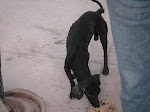



No comments:
Post a Comment